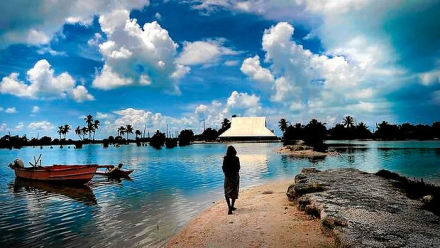Engendering the Anthropocene in Oceania: Fatalism, Resilience, Resistance

The concept of the Anthropocene confounds Eurocentric distinctions of natural and human history as Dipesh Chakrabarty observes. But who are ‘we’ in the Anthropocene, how do notions of our shared humanity contend with the cascading global inequalities of place, race, class and gender? Oceania is often said to have contributed the least and suffered the most from climate change. Pacific women, and especially those living on low lying atolls, have been portrayed as the most vulnerable to the disastrous consequences of climate change. This focuses on sea level rise and the toxic mixing, the elemental confusion of salt and fresh water caused by atmospheric changes and global warming. While not negating the gravity of present and future scenarios, how can we move beyond the pervasive fatalism of foreign framings and seemingly opposed evocations of ‘resilience’? The moniker of 350.org ‘We are not drowning, we are fighting’ evokes a contrary trope of resistance and resonates with Oceanic activism in politics and the creative arts. Tracing such a genealogy of resistance might start with a greater respect for Indigenous knowledges and embodied practices in contemporary understandings of ‘climate cultures’ in Oceania which do not routinely distinguish between natural and human history.
Margaret Jolly (FASSA) was an Australian Research Council Laureate Fellow 2010–2016. She is a Professor in the School of Culture, History and Language in the College of Asia and the Pacific at the Australian National University and was Convenor of the Gender Institute at the ANU from mid 2016 to mid 2019. She has taught at Macquarie University in Sydney, the University of Hawai’i and the University of California, Santa Cruz and has been a visiting scholar in Anthropology in Cambridge University and at Centre de recherche et documentation sur l’Océanie (CREDO) in Marseille. In 2009 she held a Poste Rouge with the Centre national de la recherche scientifique (CNRS) in France. She is a transdisciplinary scholar who has written extensively on gender in the Pacific, on exploratory voyages and travel writing, missions and contemporary Christianity, maternity and sexuality, cinema and art. She is presently focused on issues of gender and climate change in the Pacific.
This event is hosted by the School of Archaeology and Anthropology, ANU College of Arts and Social Sciences






